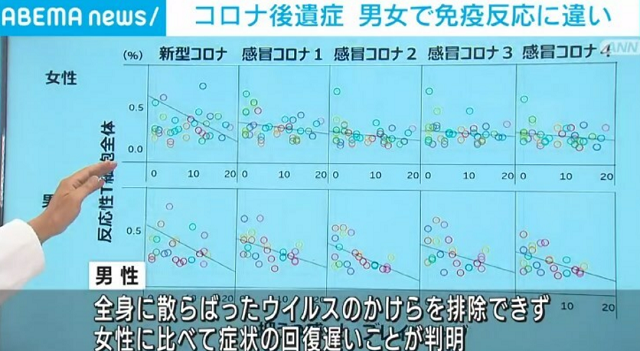Japan study: Men are more difficult to recover from COVID-19 sequelae
- Aspirin: Study Finds Greater Benefits for These Colorectal Cancer Patients
- Cancer Can Occur Without Genetic Mutations?
- Statins Lower Blood Lipids: How Long is a Course?
- Warning: Smartwatch Blood Sugar Measurement Deemed Dangerous
- Mifepristone: A Safe and Effective Abortion Option Amidst Controversy
- Asbestos Detected in Buildings Damaged in Ukraine: Analyzed by Japanese Company
Japan study: Men are more difficult to recover from COVID-19 sequelae
- Red Yeast Rice Scare Grips Japan: Over 114 Hospitalized and 5 Deaths
- Long COVID Brain Fog: Blood-Brain Barrier Damage and Persistent Inflammation
- FDA has mandated a top-level black box warning for all marketed CAR-T therapies
- Can people with high blood pressure eat peanuts?
- What is the difference between dopamine and dobutamine?
- How long can the patient live after heart stent surgery?
Japan study: Men are more difficult to recover from COVID-19 sequelae.
Regarding the sequelae of the COVID-19, a study by Professor Ueno of Kyoto University found that the immune response of men and women is different, and the recovery of symptoms is also different.

Professor Hideki Ueno of Kyoto University analyzed immune cells called “T cells” that play a role in eliminating the virus from the blood of about 2,500 patients with sequelae.
It was found that, in the case of women with intense discomfort, the overproduction of T cells can lead to uncontrolled immunity, which can cause symptoms.
On the other hand, it was found that males did not make as many T cells.
Because of this, the viral fragments scattered throughout the body seem to be irreversible, and the recovery of symptoms is found to be slower than in women.
Professor Ueno, Kyoto University: (It was found that the T cell response is not only related to the COVID-19, but also to the so-called acute coronavirus.
Since it is found that the abnormal immune response is obviously related to the sequelae, I wonder if a cure will be found to clarify the disorder of the immune response.
According to Professor Ueno, regarding the relationship between sequelae and vaccination, it was found that dysgeusia and dysgeusia were improved in women after vaccination, but not in men.
The research will soon be published in a paper.
Long-COVID: Female patients suffered more
–A survey of “Long-COVID” in which symptoms such as fatigue, shortness of breath and cognitive impairment persist for months after recovery from Covid-19.
More women suffer from chronic cobit symptoms than men…
“Long-COVID,” where symptoms such as fatigue, shortness of breath, and cognitive dysfunction persist for months even after recovery from the new coronavirus infection (COVID-19), is currently generally unknown and is an effective treatment. Not yet established.
The UK research team surveyed 2320 COVID patients discharged 5 months and 1 year after discharge from 39 healthcare facilities in the UK from 7 March 2020 to 2021.
The findings were published April 23, 2022 in the medical journal The Lancet Respiratory Medicine.
One year after discharge, fatigue, muscle pain, poor thinking ability, short-term memory impairment…807 people, 32.7% of the subjects, participated in the follow-up survey 5 months and 1 year after discharge.
The mean age was 58.7 years, 35.6% were female, and 27.8% were on acute ventilation.
The complete recovery rate was 25.5% 5 months after discharge and 28.9% after 1 year, with little change from 5 months to 1 year after discharge.
Ongoing symptoms a year after discharge included fatigue, muscle aches, lack of sleep, shortness of breath, joint pain and swelling, slow thinking and short-term memory loss.
According to the results of this survey, “femaleness”, “obesity”, and “use of a ventilator in the acute phase” are listed as risk factors that are difficult to recover even one year after discharge.
33% of women had difficulty in full recovery, 50% of obese people, and 58% of patients with acute mechanical ventilation. “Possibly spreading as a new long-term disease” in the research paper, “only a few people have fully recovered after being hospitalized with a new coronavirus infection.
QOL (quality of life) related to patient health is pre-hospital. “Without an effective treatment, long-term cobit could spread as a new long-term disease,” he warned.
“Compared with men, women complained more of long-term co-symptoms,” a team from the University of Parma, Italy, published in March 2022. A follow-up of 223 patients 5 months after the acute phase of infection with the new coronavirus Women report dyspnea, weakness, chest pain, palpitations and sleep disturbance, study shows
Japan study: Men are more difficult to recover from COVID-19 sequelae.
(source:internet, reference only)
Disclaimer of medicaltrend.org
Important Note: The information provided is for informational purposes only and should not be considered as medical advice.



